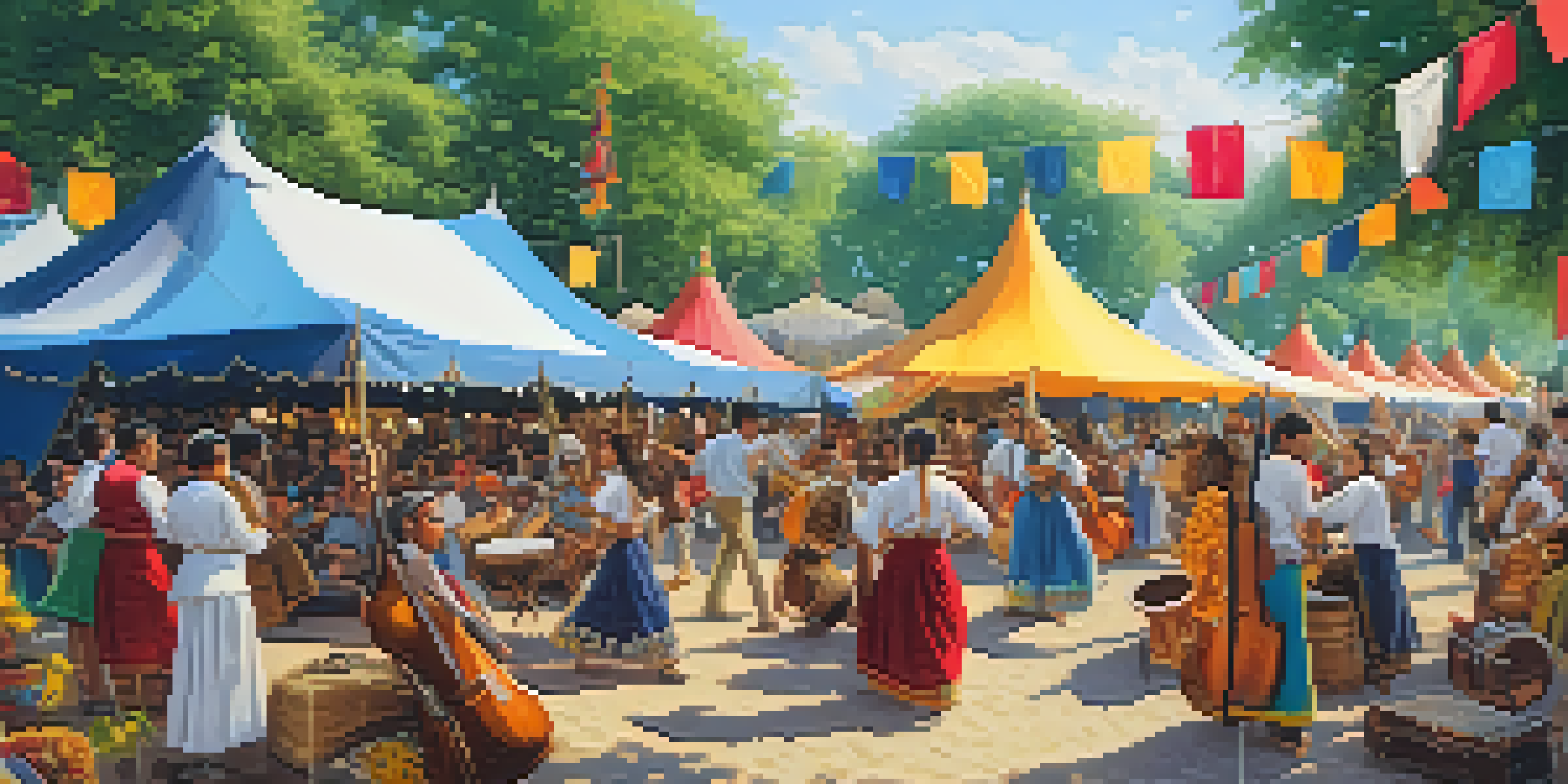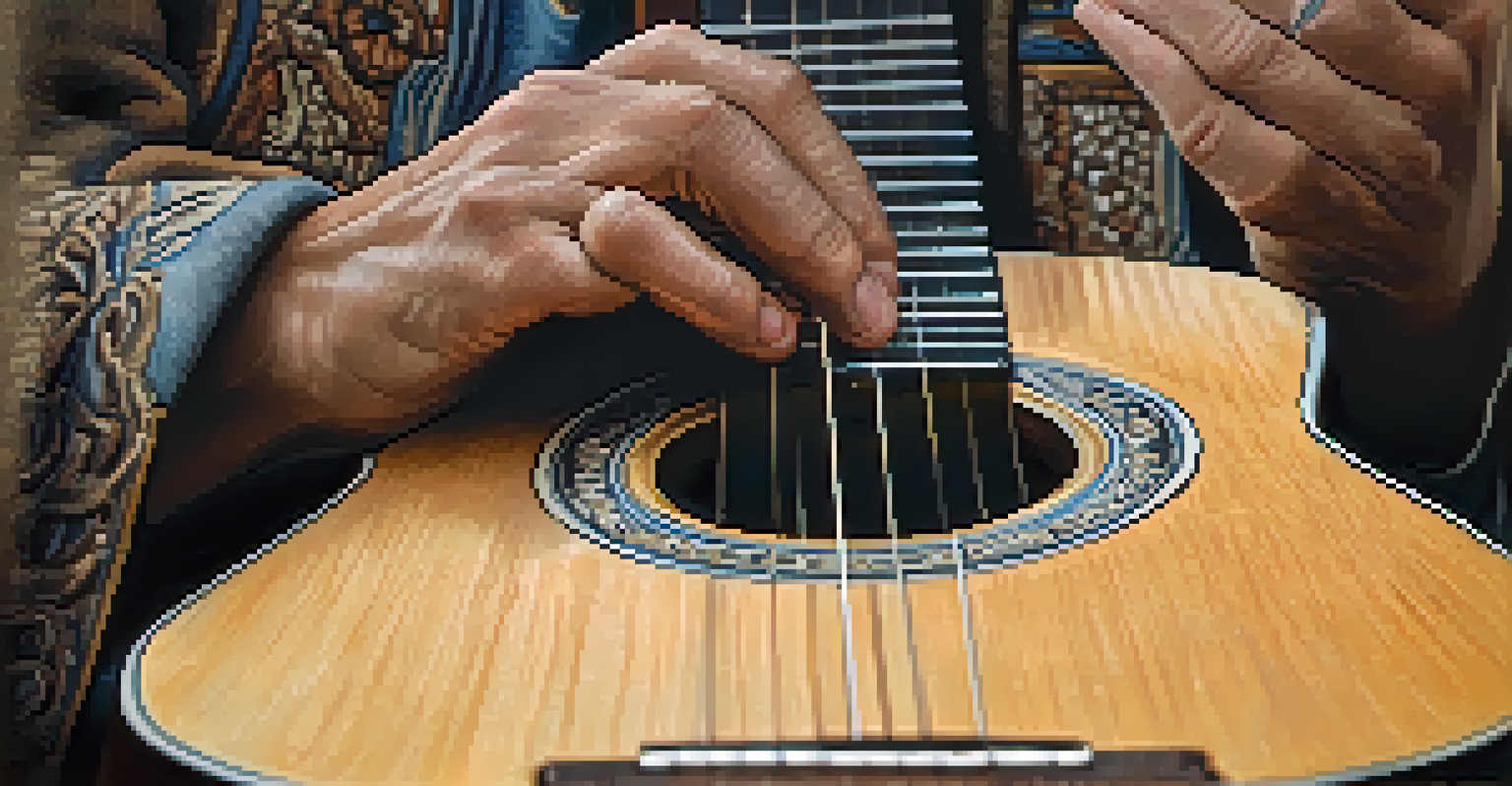The Power of Folk Music in Preserving Cultural Heritage

Understanding the Roots of Folk Music
Folk music serves as a living record of a community's history and values. It encapsulates the stories, struggles, and triumphs of the people who create it, often passed down through generations. For instance, traditional songs can reflect local customs, historical events, and even everyday life, acting as a sonic diary of a culture.
Folklore is the heart of a community, and its music carries the voice of our ancestors.
The beauty of folk music lies in its organic nature; it's not bound by formal training or rigid structures. Instead, it evolves as the community grows, adapting to changes while retaining its core themes. This adaptability ensures that folk music remains relevant, resonating with both the past and the present.
As we listen to folk music, we connect with the emotions and experiences of those who came before us. It's a reminder that music is not just entertainment; it's a vital thread that weaves together the fabric of cultural identity.
Folk Music as a Storytelling Medium
At its heart, folk music is about storytelling. Through lyrics and melodies, artists convey narratives that reflect their lived experiences and cultural heritage. For example, many folk songs tell tales of love, loss, or migration, allowing listeners to empathize with the storyteller's journey.

These stories often highlight significant cultural practices or historical events, making them invaluable for understanding a community's heritage. When people share their songs, they share their history, creating a bridge between generations. This connection fosters a sense of belonging and pride in one's cultural roots.
Folk Music as Cultural Heritage
Folk music serves as a living record of a community's history and values, preserving stories and traditions for future generations.
Moreover, folk music often encourages communal participation, inviting audiences to join in the storytelling. This creates a shared experience that reinforces cultural ties, as everyone adds their voice to the song, echoing the collective memory of the community.
The Role of Folk Music in Cultural Identity
Folk music plays a crucial role in shaping and maintaining cultural identity. As societies evolve, the music serves as a reminder of who we are, where we come from, and what we value. For many, listening to or performing folk songs can evoke a deep sense of nostalgia and connection to their heritage.
Music is the shorthand of emotion, and folk music tells the stories that connect us to our past.
In diverse societies, folk music can also highlight the rich tapestry of various cultural identities, fostering appreciation and understanding among different groups. Through festivals and community gatherings, folk music becomes a medium for celebrating diversity while finding common ground.
By preserving traditional melodies and lyrics, folk music helps ensure that cultural identities remain vibrant and relevant. This preservation is vital in a world where globalization often threatens to dilute unique cultural expressions.
Folk Music in the Digital Age
In today's digital age, folk music faces both challenges and opportunities. On one hand, the rise of technology can lead to the commercialization and dilution of traditional styles. On the other hand, digital platforms allow folk musicians to reach broader audiences, sharing their heritage with the world.
Social media and streaming services have made it easier for artists to share their work and for listeners to discover new folk music. This accessibility can spark interest in cultural heritage among younger generations, encouraging them to explore and participate in their traditions.
Storytelling Through Song
At its core, folk music is a powerful storytelling medium that connects listeners to the experiences and emotions of those who created it.
Additionally, online forums and communities provide spaces for discussions about folk music's significance, allowing people to connect over shared experiences. This engagement helps ensure that folk music continues to thrive, adapting to contemporary contexts while honoring its roots.
The Educational Value of Folk Music
Folk music serves as an educational tool, teaching listeners about historical events, social issues, and cultural practices. By engaging with folk songs, individuals can gain insights into the values and beliefs of a culture, fostering appreciation and respect.
Many educational programs now integrate folk music into their curricula, using it as a means to explore cultural diversity. Through workshops, students learn not only about the music itself but also about the stories and histories behind the songs, making learning more engaging and relatable.
By understanding the context of folk music, audiences can better appreciate its significance. This educational approach not only preserves the music but also strengthens cultural ties and promotes intercultural dialogue.
Folk Music's Influence on Modern Genres
Folk music's influence can be seen in many modern musical genres, from pop to rock and even hip-hop. Artists often draw inspiration from traditional folk melodies, rhythms, and storytelling techniques, creating a fusion that keeps the essence of folk alive. This blending of styles helps to introduce folk music to new audiences, ensuring its continued relevance.
For example, contemporary artists like Mumford & Sons and The Lumineers have incorporated folk elements into their music, appealing to a wider audience while paying homage to their roots. This crossover not only revitalizes interest in folk traditions but also encourages listeners to seek out the original forms.
Digital Age Opportunities
In the digital age, folk music faces challenges but also gains opportunities for wider reach and engagement among younger audiences.
By weaving folk themes into popular music, artists contribute to the preservation of cultural heritage. This modern appreciation of folk music helps bridge generations, reminding us that cultural stories and traditions are timeless.
Community and Folk Music: A Lasting Bond
Folk music is inherently communal, often performed in gatherings that foster connections among participants. These events create a sense of belonging, allowing individuals to share their cultural experiences and stories through music. Whether at festivals, local pubs, or family gatherings, folk music brings people together.
Such communal experiences reinforce cultural ties and help preserve traditions. When communities come together to celebrate their folk music, they not only enjoy the moment but also pass down their heritage to future generations. This transmission is crucial for maintaining the vibrancy of cultural practices.

Ultimately, the bond formed through folk music strengthens the community's identity. As songs are sung and stories are shared, the cultural heritage thrives, reminding us all of the power of music to connect us across time and space.